Giri/Haji, the Japanese title of this multi-continent drama, means Duty/Shame in English. Those two words – duty and shame – encapsulate the themes and drivers of the action in this drama about family, love, responsibility and survival. It’s streaming on Netflix. There are minor spoilers ahead.
Giri/Haji is promoted as a suspense mystery about Yakuza gangsters from Japan who work in London. It is about that, but only as a way to explore connections between people and places. This is really a relationship drama.
In 8 hour-long episodes, this series provides an epic saga. There is so much happening to with so many characters. They are all impacted by the violence spawned in Japan by warring families.
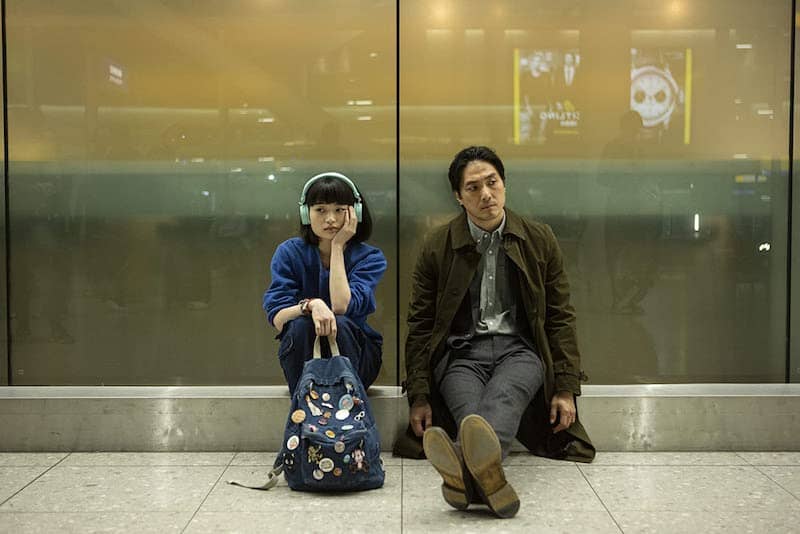
The story begins in Japan, where police detective Kenzo (Takehiro Hira) lives with his parents, his wife, and his rebellious teen daughter Taki (Aoi Okuyama).
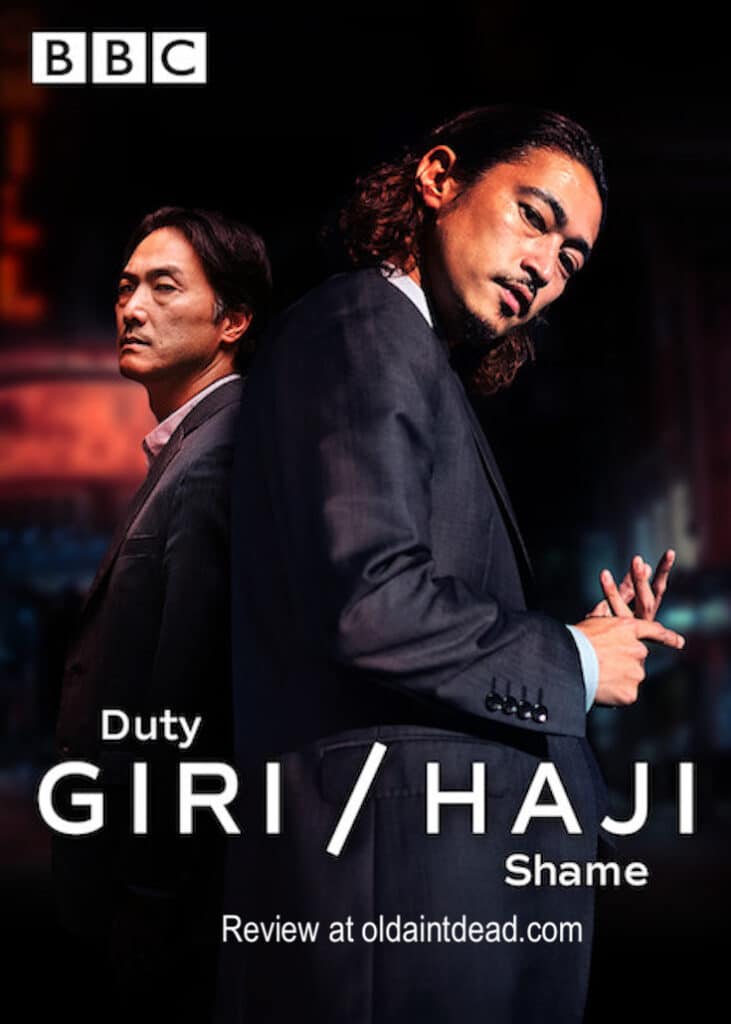
Kenzo does something illegal to protect his younger brother, Yuto (Yôsuke Kubozuka). Yuto is a gangster. Most of the series is devoted to Kenzo’s efforts to protect his brother from the many troubles he brings upon himself.
While killing people on the one hand, Yuto falls in love with the boss’s daughter, Eiko (Anna Sawai). He gets her pregnant and wants to marry her. Nope – that won’t happen. Yuto runs.
Everyone thinks Yuto is dead, but he’s really in London, working for a crook named Abbott (Charlie Creed-Miles). When that is discovered, the police send Kenzo there to bring him home.
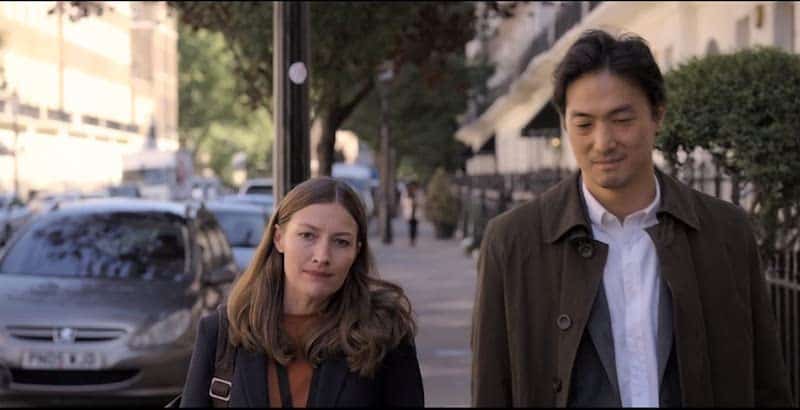
Kenzo pretends to be a student in a law-enforcement seminar in London. The teacher is Sarah (Kelly Macdonald), a cop who turned in her cop boyfriend (Jamie Draven) for planting evidence. Slowly – very slowly – something resembling a relationship develops between these two.
Kenzo and Sarah have the most telling conversation of the series, late in the story. Kenzo tells her, “We aren’t bad people. We just did bad things.”
Sarah asks, “Is there really any difference?”
The way you as a viewer answer that question determines how you feel about who should live, who should die, who should be redeemed, and who should blossom in this complex and convoluted tale.
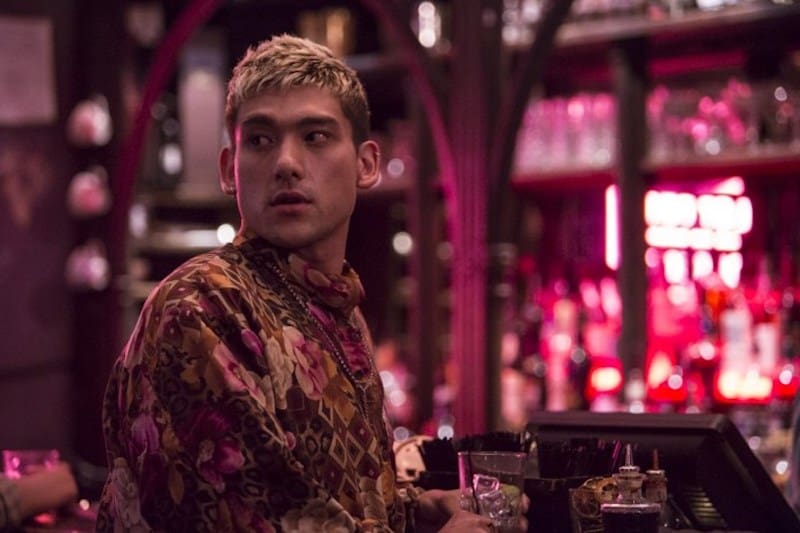
When Kenzo arrives in London, he stumbles on Rodney (Will Sharpe), a half-English half-Japanese drug-addicted rent boy. Will Sharpe lights up the screen in every scene he’s in. Where most of the characters are doing something nefarious, Rodney is just trying to survive and make the rent. He does kind things for Kenzo and others that he didn’t need to do. He’s sweet and smart and gets all the best lines. While many of the other characters are seeking redemption, Rodney doesn’t need to do that.
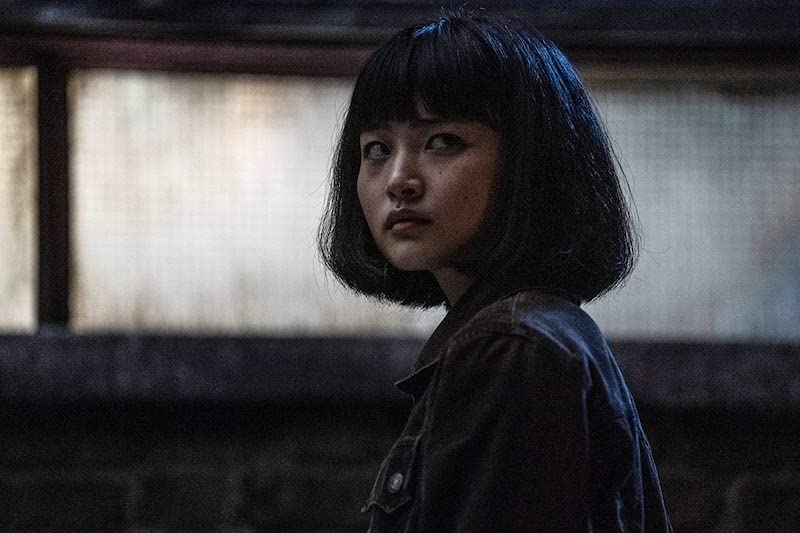
Back in Japan, Taki takes a credit card and jumps on a plane for London. She thinks she’ll be welcomed by her dad, but she’s really walking into the middle of a war zone. In London, Rodney takes her out clubbing. Taki spots a woman she likes and spends much of her time exploring her sexuality with this woman – that keeps her out of harms way most of the time.
After a big gang war in London, Kenzo, Yuto and Taki all end up hiding out in Sarah’s house. This makes Sarah an accessory to a bunch of illegal things.
In Japan, the Yakuza men struggle to get the violence under control. This offers a glimpse into ancient Yakuza traditions for bringing peace.
The women, including Kenzo’s wife, mother, and Yuto’s girlfriend, all run off with Yuto’s baby. The bad guys are chasing them, too.
Every time there’s a lull in the action, the two characters with a conscience and a sense that they have a duty as police officers debate what they should do about the criminals around them. They are bent themselves, when it comes down to it. Kenzo is determined to protect Yuto. Sarah doesn’t seem able to commit to much in terms of law enforcement, because she’s confused by liking Kenzo more and more all the time.
This is an involved story with characters I haven’t mentioned playing big parts.
The way the series is shot is eclectic to say the least. There are flashbacks, fantasy moments, modern dance sequences, animation, split screens, black and white segments, and jumps back and forth in time. I felt like the directors couldn’t decide for sure how to handle such a big story with so many hours to fill, so they tried everything.
There were brilliantly executed shots inside numerous cars. There were drone shots, shots where the camera swooshed away, frames that drew into nothingness. The story went from action scenes to almost family-like outings with Kenzo, Taki, Yuto, and Sarah all stuffed into Sarah’s little sedan putting around London. The technique I found most interesting was a parallel set of action sequences – one in London, one in Japan – that showed very similar things happening in both places at the same time.
Giri/Haji is never boring. The actors are excellent. But there’s a lot to it that isn’t gangster action, so don’t go into expecting full on gun fights at every turn.

Take a look at the trailer for the series.
Have you watched this series? What did you think of it?

Leave a Reply